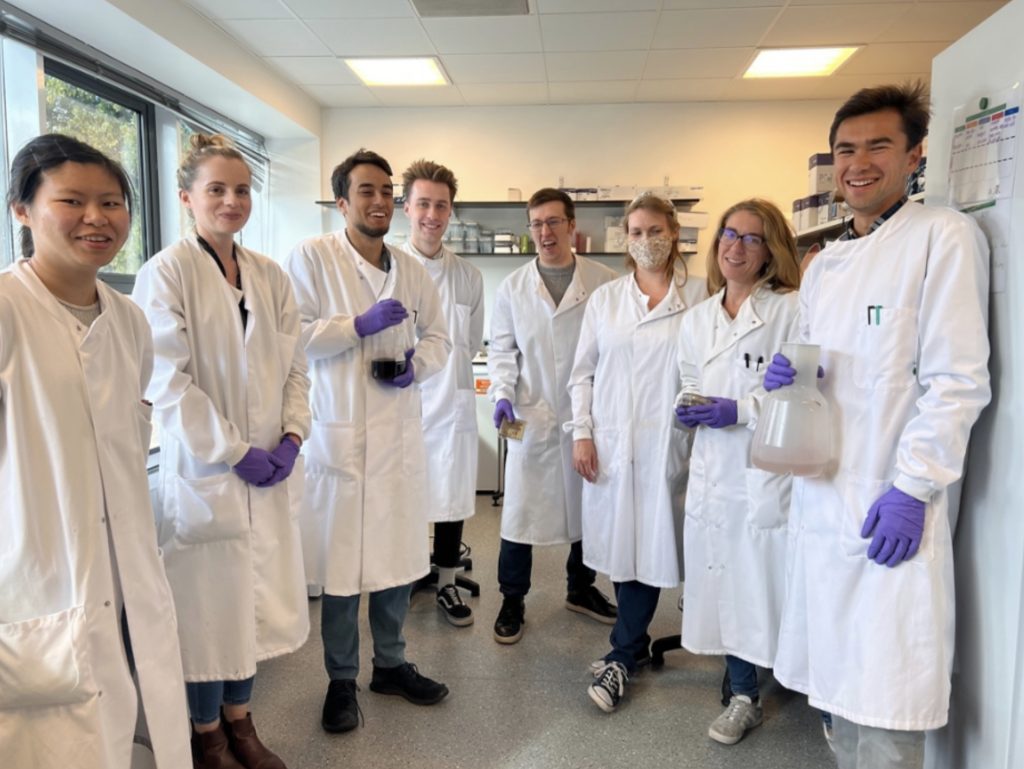Beginning of this summer, we had Laurence Legon joining our Microbial Engineering Division as an intern, to support the team in the Research and Development for a specific project.
Laurence is a PhD student at the University of Warwick’s Synthetic Biology CDT and has been working with the team in developing pigment-producing microorganisms to expand Colorifix’s colour palette, with some fun in the mix.
We really enjoyed having Laurence around, so we sat down to hear about his experience at Colorifix.
Tells us a bit about yourself (it can be anything)
Laurence: I’m a PhD student with the University of Warwick’s Synthetic Biology CDT. For my PhD, I’ve been trying to synthesise natural sunscreens. To do this, I’ve been expressing sunscreen synthesis genes in bacteria, and developing software that predicts ways that we can link cell growth to the synthesis of useful chemicals, so that we can then use evolution to improve microbial pigment production.
Did you know about Colorifix before joining our team and how did this opportunity arise?
Laurence: Yeah, I heard a talk from Colorifix at SynBio in Oxford back in 2020, and thought it sounded like a really cool concept. A couple of years later, I looked at the Colorifix website and found that you offered PhD internships, and I thought that sounded like a great opportunity to see what synthetic biology looks like in the real world. My PhD programme don’t do PIPS internships, so a lot of negotiation between myself, my university and Colorifix was required to sort out a contract, but fortunately we were able to come to an agreement and I was able to come here.
What was the biggest challenge you faced at Colorifix?
Laurence: There’s a lot going on here, which can be overwhelming at first. I didn’t have any background in material science either, so the dyeing process was alien to me when I started. Everyone was helpful though, which made it a lot easier to get up to speed.
What learning would you highlight during your time with us?
Laurence: I’ve definitely learned a lot about dyes- I can’t look at anything in nature that makes colour without wondering about how it makes it! The biology behind these compounds is interesting- I’ve enjoyed learning more about it.
I think I’ve also learned about the value of being adaptable- if something you have made has properties that make it bad at the application you have in mind, it can often be the case that these properties make it perfect for solving another problem, and so it’s important to have an open mind and be flexible.
Did your experience reflect differences between academia and industry? If it did, which ones?
Laurence: There are definitely different priorities between the two. In academia, you might be focusing on whether something works or not, and if it is novel enough to make a good paper. However, in the industry, there are many other factors that need to be considered- how expensive is this, can it be efficiently scaled up, are there any patents that might affect this, and so on.
Also, there is a lot of focus on standardisation, and making protocols that can be reproduced by other people in the company- the reproducibility crisis is proof that academia can be quite poor at this.
Has your experience changed your idea of science in industry?
Laurence: Something that I didn’t appreciate was the emphasis on speed in industry. In academia, we often take the slow route- but here, there’s no reluctance to spend money if that’s the best way of increasing throughput or getting results more quickly.
Also, there’s a lot more teamwork in industry. In academia, people do help each other out, but everyone has their own projects that they need to prioritise. Here, the most important thing is the output of the team, so people are able to work together more instead of focusing on individual achievements.
What do you want to do after your PhD?
Laurence: I know that I want to stay in science. I’m not certain yet what form that will take, but I’m leaning towards industry.
What advice would you give to someone who is just starting a career in the same field as yours?
Laurence: I’d really encourage getting some industrial experience. Synthetic biology is quite an applied science- the reason that we are interested in engineering biology is generally because we are interested in using it to solve real-world problems like disease, famine, pollution and so on. However, there is a big gap between something that works in the lab, and something that offers an economically viable solution that can operate at scale, and getting industrial experience is a really good way of learning how to bridge this gap.

Thank you, Laurence and all the energetic and smiley MED team who dedicate their time and knowledge in bringing more sustainable colours to our world!